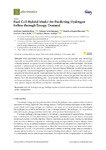Mostrar o rexistro simple do ítem
Fuel cell hybrid model for predicting hydrogen inflow through energy demand
| dc.contributor.author | Casteleiro-Roca, José-Luis | |
| dc.contributor.author | Barragán, Antonio Javier | |
| dc.contributor.author | Segura Manzano, Francisca | |
| dc.contributor.author | Calvo-Rolle, José Luis | |
| dc.contributor.author | Andújar-Márquez, José Manuel | |
| dc.date.accessioned | 2019-12-09T15:40:33Z | |
| dc.date.available | 2019-12-09T15:40:33Z | |
| dc.date.issued | 2019-11-10 | |
| dc.identifier.citation | Casteleiro-Roca, J.-L.; Barragán, A.J.; Manzano, F.S.; Calvo-Rolle, J.L.; Andújar, J.M. Fuel Cell Hybrid Model for Predicting Hydrogen Inflow through Energy Demand. Electronics 2019, 8, 1325. | es_ES |
| dc.identifier.issn | 2079-9292 | |
| dc.identifier.uri | http://hdl.handle.net/2183/24448 | |
| dc.description.abstract | [Abstract]: Hydrogen-based energy storage and generation is an increasingly used technology, especially in renewable systems because they are non-polluting devices. Fuel cells are complex nonlinear systems, so a good model is required to establish efficient control strategies. This paper presents a hybrid model to predict the variation of H2 flow of a hydrogen fuel cell. This model combining clusters’ techniques to get multiple Artificial Neural Networks models whose results are merged by Polynomial Regression algorithms to obtain a more accurate estimate. The model proposed in this article use the power generated by the fuel cell, the hydrogen inlet flow, and the desired power variation, to predict the necessary variation of the hydrogen flow that allows the stack to reach the desired working point. The proposed algorithm has been tested on a real proton exchange membrane fuel cell, and the results show a great precision of the model, so that it can be very useful to improve the efficiency of the fuel cell system. | es_ES |
| dc.description.sponsorship | Ministerio de Economía, Industria y Competitividad; H2SMART-mGRID (DPI2017-85540-R) | es_ES |
| dc.language.iso | eng | es_ES |
| dc.publisher | MDPI | es_ES |
| dc.relation.uri | https://doi.org/10.3390/electronics8111325 | es_ES |
| dc.rights | Creative Commons Attribution (CC BY 4.0) | es_ES |
| dc.rights.uri | http://creativecommons.org/licenses/by/3.0/es/ | * |
| dc.subject | Fuel Cell | es_ES |
| dc.subject | Hydrogen energy | es_ES |
| dc.subject | Intelligent systems | es_ES |
| dc.subject | Hybrid systems | es_ES |
| dc.subject | Artificial neural networks | es_ES |
| dc.subject | Power management | es_ES |
| dc.subject | Pila de combustible | es_ES |
| dc.subject | Energía del hidrógeno | es_ES |
| dc.subject | Sistemas inteligentes | es_ES |
| dc.subject | Sistemas híbridos | es_ES |
| dc.subject | Redes neuronales artificiales | es_ES |
| dc.subject | Gestión de potencia | es_ES |
| dc.title | Fuel cell hybrid model for predicting hydrogen inflow through energy demand | es_ES |
| dc.type | info:eu-repo/semantics/article | es_ES |
| dc.rights.access | info:eu-repo/semantics/openAccess | es_ES |
| UDC.journalTitle | Electronics | es_ES |
| UDC.volume | 8 | es_ES |
| UDC.issue | 11 | es_ES |
Ficheiros no ítem
Este ítem aparece na(s) seguinte(s) colección(s)
-
GI-CTC - Artigos [83]






